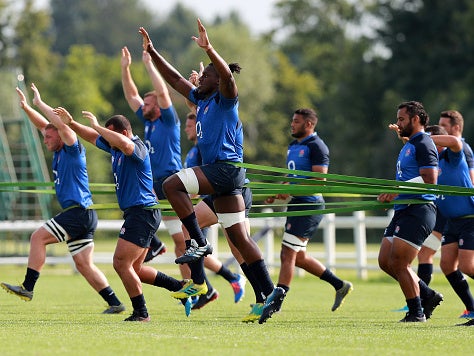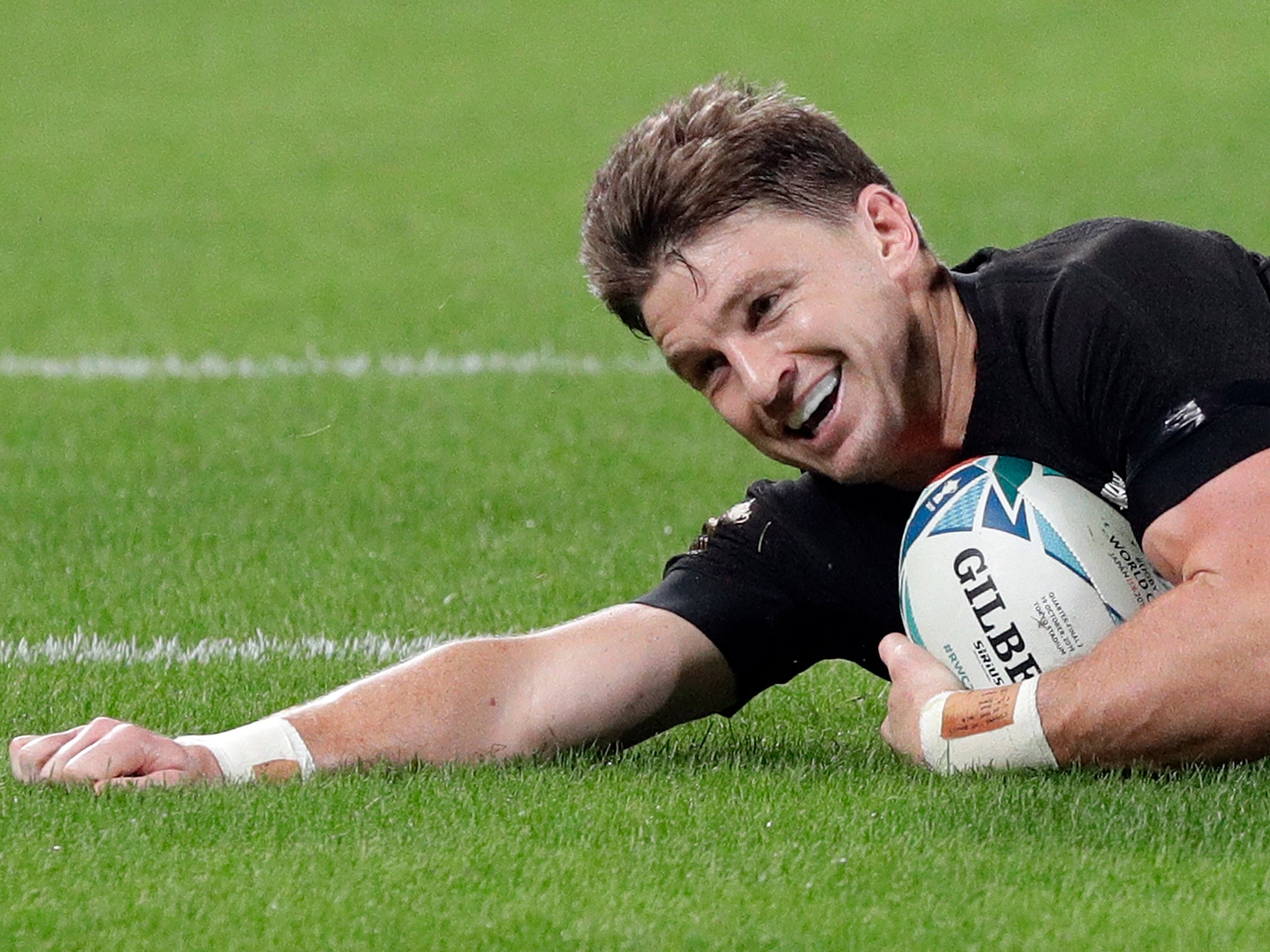Rugby World Cup 2019: England stand at gates of history as 80 minutes grips nations and defines careers
This trial, against a formidable All Blacks side, is the vision that has sustained this group of players since they first picked up a ball

Your support helps us to tell the story
From reproductive rights to climate change to Big Tech, The Independent is on the ground when the story is developing. Whether it's investigating the financials of Elon Musk's pro-Trump PAC or producing our latest documentary, 'The A Word', which shines a light on the American women fighting for reproductive rights, we know how important it is to parse out the facts from the messaging.
At such a critical moment in US history, we need reporters on the ground. Your donation allows us to keep sending journalists to speak to both sides of the story.
The Independent is trusted by Americans across the entire political spectrum. And unlike many other quality news outlets, we choose not to lock Americans out of our reporting and analysis with paywalls. We believe quality journalism should be available to everyone, paid for by those who can afford it.
Your support makes all the difference.Did England’s players look out of their Tokyo hotel windows on Friday morning, see the rain gusting in off the bay in great, monochrome sheets, and dream of Treviso? The northern Italian resort where they held their summer training camp was in many ways the polar opposite of wet, autumnal Tokyo: scorching sunny days, pleasant warm evenings, a relaxed atmosphere and idyllic bike rides into the countryside.
Then again, maybe not. If you were to sweep the memories of England’s players now, their overriding impressions of Treviso will be of discomfort: double training sessions at higher than match intensity in cloying heat, with the mercury hitting 35C, the humidity at 85 per cent, and the mosquitos feasting on virginal English flesh. “Absolute hell,” is how Joe Marler described it at the time. But Treviso was also where this side was forged: beasted and brutalised, held to the fire, girded for the rigours of games like these.
This is what it was all for, then: all these long months away from home, all those awful sprint training sessions, all those hours hoisting and hauling massive carpets across the field, every press-up you had to do with a team-mate sitting on your back. This was what kept you going: a World Cup semi-final against the greatest side in history, 80 minutes that will grip nations and define careers. This is the vision that sustained you when first picked up a rugby ball and started flinging it around. This is why you play the game.
It’s a semi-final that feels like a final, both in its heft and its mystique. These are the two best teams left in the tournament, teams who have played each other just once in five years, the sort of game that World Cups are for. It’s a clash of opposites: northern hemisphere against southern, All Black against all-white, pure oozing pedigree against pure, breathing potential. Evidently, New Zealand start as favourites. Equally evidently, until Nigel Owens peeps on his whistle and brings up the curtain, nobody can be remotely certain.
It has felt like an interminable week. A match that needed no salesmanship has had plenty of it nonetheless: a phoney war being played out not just on tactics boards and in team meetings but on the airwaves, stoked by a thirsty media with hours and pages to fill, and with the eager connivance of two coaches at the very top of their game. For Steve Hansen and Eddie Jones, you get the sense that this is the part they most enjoy. For the players, muzzled and shackled, you get the sense that this is the part they most despise.
According to his brother Beauden, with whom he has been sharing a hotel room, Scott Barrett is already so engrossed in the contest that he has been calling out lineout codes in his sleep. The middle of the five Barrett brothers, three of whom are in the matchday 23, Scott’s selection at blindside over Sam Cane has been the main source of intrigue in the build-up, and offers an insight into where Hansen believes England are vulnerable.
The consensus is that Scott has been chosen as a fourth lineout option, an attempt to dominate an area of traditional English strength, one that was successfully disrupted during New Zealand’s 16-15 win at Twickenham last November. There’s an element of truth to that, but perhaps there’s more to it too. For all his ability in the air, Scott is also superior to Cane with ball in hand, and from 1 to 15 the All Blacks have the look of a side prepared to pick and carry, to pass and offload, to punch and stampede for as long as it takes until a hole appears.
At which point, enter Beauden. The world’s greatest rugby union player is adept at creating holes as he is at exploiting them, and if England allow him more than a few yards on the ball you can guarantee they will spend much of the evening turning on their heels. Beauden’s counter-attacking ability in back field is another reason why England’s kicking game will have to be immaculate, their chase co-ordinated and ruthless.
Meanwhile, England’s own reconditioned No 15 will face the sternest test of his career to date. Everyone knows what Elliot Daly can do in attack, but it is his defensive work that will be under the microscope here. It is one of the few certainties in his game that New Zealand will look to test him with plenty of high balls, look to isolate him in one-on-one situations, much as Australia’s Marika Koroibete did in scoring Australia’s only try in Oita last weekend. But Jones’s faith in his full-back is total, a calculated gamble whose success depends on his 14 team-mates giving him a viable platform.

Back in Treviso, Jones would hold full 15-a-side training games, in which any player who strayed offside would be issued with a yellow card, despatched to the corner of the field and flogged with press-ups and shuttle runs. It was a harsh punishment that achieved two aims: firstly it enforced a ruthless intolerance of indiscipline that has seen dramatically reduced England’s penalty count, and secondly it provided valuable experience of playing 14 v 15, which in an atmosphere as febrile and high-pitched as a World Cup semi-final could very conceivably come to pass
So you’ve got through the first hour and you’re still in the game. What then? Jones believes the final quarter will be the most pivotal period, a truism that nonetheless serves as an acknowledgement of how the All Blacks can finish you off in the last 20 minutes. Cane will doubtless make his bow at this point to enforce order at the breakdown, and with the likes of Sonny Bill Williams and TJ Perenara lurking on the sidelines, New Zealand have the bench to turn the game any which way.

England’s bench, by contrast, looks better suited to containment. Marler and Dan Cole could wreak havoc on a tired scrum, but if England are forced to chase the game in the closing stages, you sense they will need something very special indeed. Tired, risk-taking oppositions are where this New Zealand side eat and drink, and there is no side in the game more adept at punishing lapses and running up the score in brazen, insouciant bursts.
Often it’s said that the opening exchanges hold the key to the game. Here, England will need to be at their peak from first minute until last. That level of intensity, the minuscule margins for error, their relative inexperience in these sorts of games and New Zealand’s formidable strength in depth is why only an arch-optimist would dare to back them on Saturday. Either way, this should be a feast to savour: an encounter that will stimulate and stir the imagination until its very last second.
Join our commenting forum
Join thought-provoking conversations, follow other Independent readers and see their replies
Comments